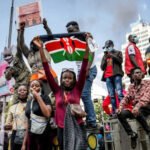The Nigerian government has assured that the country’s disability databank will capture all persons living with disabilities (PLWDs) in every part of the nation.
National Coordinator of the Nigeria Disability Databank (NDDB), Anthony Uwa, who gave the assurance, said the NDDB had been designed to boost inclusive development.
The World Health Organisation (WHO) estimates put the number of people with disability in the country at 28 million.
President Muhammadu Buhari had in 2019 signed into law the Discrimination Against Persons with Disabilities (Prohibition) Act 2018.
The Act ensures the protection and provision of rights to people with disabilities across all areas.
In line with the Act, President Buhari approved the creation and implementation of the database of PLWDs, internally displaced persons (IDPs) and the less-privileged persons.
Special Assistant to President Muhammadu Buhari on Disability, Samuel Ankeli, had said in August 2020 that the introduction of the Basic Registry and Information System in Nigeria (BRISIN) was to enable the government to incorporate PLWDs into the country’s social development programmes.
The NDDB was therefore created after more than 20 years of advocacy for the protection and provision of rights to people with disabilities in the country.
Before the creation of NDDB, one of the vibrant campaigners for the protection of PLWDs in Nigeria, Disability Rights Advocacy Centre (DRAC), had assisted researchers, the media and other persons interested in issues that affect PLWDs with the provision of a wide range of resource material.
The non-governmental organisation (NGO) publishes content, including newsletters, fact sheets, reports and guidelines, on disability that helps all stakeholders better understand disability issues.
‘The databank will capture all PLWDs, the less privileged and IDPs in every nook and cranny of the country with their biometrics, the Federal Capital Territory (FCT) is a pilot state’, the News Agency of Nigeria (NAN) quoted Uwa as saying.
‘It will also build a disabled database structure together with a skill acquisition centre at every area council or local government area (LGA) for easy management of PLWDs and others.
‘It will provide buses for easy transportation to access schools, hospitals and other social services. Also, provide ambulances for emergency health situations.
‘The databank will also ensure that PWDs are carried along in the country’s socio-economic development and also given a sense of belonging by working with agencies responsible for PWDs’.
Uwa, who also heads BRISIN, appealed to donor agencies, both international and local, to contribute to the programme.
Source: News Agency of Nigeria
Photo source: NDDB






